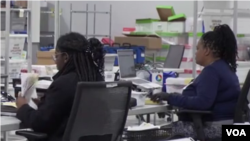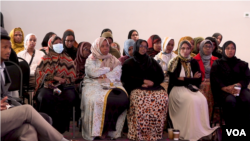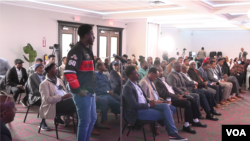
One of the most ethnically diverse counties in the Southeastern United States will be among those issuing early voting results Tuesday night, a reveal that could indicate which of the presidential candidates is in the lead in the crucial count of 538 electoral votes.
The victor must receive at least 270 of those electoral votes, and Georgia, seen as one of the seven states where the outcome is uncertain, has 16 of those precious votes. Only Pennsylvania has more — 19 — among the battleground states. North Carolina also has 16.
The other wild cards are Arizona (11), Michigan (15), Nevada (6) and Wisconsin (10).
It is possible for the declared victor in the electoral count to lose the national popular vote total. That last happened in 2016, when Republican Donald Trump won 304 electoral votes but lost the popular vote to Democrat Hillary Clinton by about 2%.
It could be days before the United States knows who its next president will be, but at the Gwinnett County Voter Registration and Elections headquarters in the swing state of Georgia, workers are already scanning several hundred thousand ballots submitted in advance by mail-in and early voters. The tabulations of those ballots will be released the moment the polls close at 7 p.m. on Tuesday.
Up to 70% of the vote total from those already-processed ballots will be known within that first hour, said Zach Manifold, the county's elections supervisor.
"And then, kind of a long night begins," Manifold told VOA on Monday. "Our first precinct usually arrives maybe about 8:30, just depending on how much line there is at seven o'clock. But 8:30 is the first precinct. We have 156 precincts that all have to come back. I don't know why, but it always seems like that last one comes in sometime between 11:30 and midnight.
"After you get past midnight, you'll probably have just about all the precincts in and have a pretty good feel for the final — at least the unofficial results — for Gwinnett," Manifold said.
To demonstrate transparency, the media, which is expected to include dozens of TV news crews and other journalists from around the world, will be allowed in the large room where the ballots are opened. The reporters will be kept behind a cordon but not prevented from observing the entire process. Activities in the tabulation room, in another part of the same building, will be livestreamed online.
Gwinnett County, with a population of about 1 million, is the second-largest county in Georgia. It is remarkable for its exceptional diversity, with no single ethnic group making up more than about one-third of its residents. In 2023, non-Hispanic whites made up about one-third of the country's population, as did African Americans, according to census data.
"We have a very large Hispanic population, Asian population, Black population," said Manifold. "It is a very much a mixture of what is America. And, so, I think a lot of the reason that people are wanting to see what Gwinnett's like [on election night] is, I think, Gwinnett is a lot like modern America."
Democrat Joe Biden's strong margin in this suburban county four years ago helped him narrowly win Georgia and thus the presidency, unseating Trump.
Gwinnett County voted Republican every year between 1980 and 2012, but in line with a trend of suburban political realignment, went narrowly for Democrat Hillary Clinton in 2016. Trump, a political novice that year, won Georgia overall in 2016, which was key to his unexpected presidential victory.
Regardless of the outcome this week, Manifold knows he will be drinking a lot of coffee from Tuesday morning to stay alert.
"It's about a 24-hour day a lot of the time in these presidential elections," he said. "I'll start at our warehouse at 4 a.m., and we'll see what time we get out of here at the main office."



























